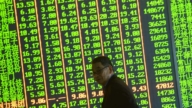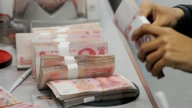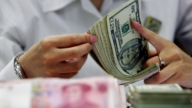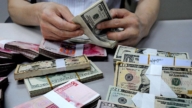【新唐人2014年03月25日訊】中共央行自從2月末開始介入壓低人民幣兌美元的價值,今年以來已經壓低2.8%,幾乎抹平了去年的漲幅,並且讓人民幣進入十年來罕見的疲軟時期。美國國會可能再次掀起指控中共操控貨幣的聲浪。但大陸經濟學者認為,延續了兩個多月的人民幣下跌,最初可能是央行故意壓低,但是到後來則是因為市場看衰中國經濟而造成貶值。
美國《華爾街日報》報導說,最近人民幣對美元比率的下滑,惡化了中美之間的貿易緊張,並提升了潛在貨幣戰爭的擔憂。美國和其他亞洲國家的官員和政客相信,中共在故意壓低人民幣到市場價值以下,以讓出口商在海外市場競爭當中佔據優勢。
據《華爾街日報》引述華府「彼得森國際經濟研究所」高級研究員Fred Bergsten的話說,他感到驚訝,「中共願意讓人民幣下跌這麼多、這麼快、這麼久。」 「如果這個動作進一步加大,它顯然將重燃國會(對於中共的)貨幣操縱的指控。」
美國民主黨參議員和參議院財政委員會謝若德•布朗(Sherrod Brown),週四呼籲國會通過一項法律制裁中共。布朗說,「隨著中共政府繼續壓低人民幣價值,通過有關處理操縱貨幣的兩黨法案迫切性增加。」
報導說,根據熟悉中共央行想法的知情人透露,央行認為,需要通過貶值,來驅逐那些下注人民幣會持續升值的投機者。
中國金融智庫研究員鞏勝利認為,貶值初期央行是為了阻擊投機者,但是如果人民幣持續的貶,那可能就不是中央銀行壓低造成的結果了。他認為,這是中國的經濟結構、以及貨幣投放與國際的金融環境,有很大的悖論造成的。
中國金融智庫研究員鞏勝利:「第一,中國現在人民幣投放是歷史的最高峰,已經超過了大概110萬億M2(貨幣供應量),這是歷史的最高峰。第二個就是,現在中國貨幣投放量是美元投放量的超過兩倍,是歐元的倍率更高。我覺得中國目前的貨幣政策在全球G20國家裏面是最麻煩的。因此我說中國的貨幣現在出手和緊縮都麻煩,處在兩難的困境。」
《華爾街日報》報導說,市場參與者由於擔憂最近經濟增長放緩的跡象,因而拋售人民幣。
鞏勝利也認為,人民幣持續下跌跟外界看衰中國經濟有關。
鞏勝利:「我想可能與中國資本運行的債務有關。比如像中國地方政府的債務,它面臨著很麻煩的事情。因為中國很多的債務,它不能陽光化。比如中國的黨的系統的組織部和宣傳部,還有統戰部的這些錢花出去的人民幣都沒有公開,它造成的黑洞到底有多大?所以這是一個很大的麻煩的問題。債務多了,人們都沒有信心了,它怎麼不貶值啊?」
今年以來,人民幣已經壓低2.8%。而去年一年,人民幣對美元升值才升了百分之一點八。鞏勝利認為,美國的量化寬鬆QE繼續縮減,到十月份,美國第三次量化寬鬆政策(QE3)將全部收回。美元將會吃緊。
鞏勝利:「接下來看有兩個可能。一個是通貨膨脹,這個很有可能的一種現象。還一個就是,如果持續貶值的話,那中國的財富,特別是國家的財富還有老百姓的財富,都可能會縮水。這個縮水對中國的產業特別是能源產業,比如,水、電、煤氣、石油這些產業會構成非常大的壓力,特別是中國的房地產。資金鏈的短缺,我覺得是非常麻煩的一件事情。」
《華爾街日報》報導說,在今年頭兩個月,中國經濟大幅減弱,加深了目前的7.5%(GDP)增長速度可能進一步減速的擔憂。中共最高領導人現在面臨:是否擱置經濟改革措施這個艱難的決定,比如遏制信貸飆升,將可能在短期內抑制GDP增長。
華府「彼得森研究所」的Bergsten表示,中共在利用它的貨幣來處理經濟問題,這將讓緊張加劇, 「他們顯然在挑起新的嚴重麻煩」。
採訪編輯/秦雪 後製/陳建銘
The Stumbling Yuan Could Ignite Currency War
Wall Street Journal reported, that China’s central bank
has intervened since late February to drive down the value
of the yuan against the U.S. dollar by 2.8% so far in 2014,
almost erasing all of its gains last year and ushering in a rare
period of weakness for a currency which has steadily
appreciated over the past decade, and it will clearly reignite
the currency manipulation charges in the Congress.
However, Chinese economists believe that the central bank’s
manipulation of the decline of RMB over the past two months
could eventually lead to depreciation of yuan due to the poor
market caused by the manipulation.
WSJ reported, The recent sharp decline in the Chinese
currency is threatening to exacerbate China’s trade tensions
with the U.S. and raising concerns over a potential
currency war in Asia.
Still, officials and politicians in the U.S. and other Asian
nations believe China is intentionally keeping the yuan below
its true market value to give exporters an edge over
competitors in overseas markets.
C. Fred Bergsten, a senior fellow at the Peterson Institute
for International Economics, told WSJ, “I’m surprised that
the Chinese would let the renminbi drop so far so fast
so long", and “If the movement continues much further,
it will clearly reignite the currency manipulation charges
in the Congress and elsewhere here."
On Thursday, Sherrod Brown, a U.S. Democratic senator
and a member of the Senate Finance Committee called
on Congress to pass a law to sanction China.
He said, As the Chinese government continues
to push down the value of the yuan, the urgency for passing
our bipartisan bill addressing currency manipulation rises,
reported WSJ.
WSJ said, The People’s Bank of China argues
the depreciation is needed to drive out speculators who were
betting the yuan would continue to rise, according to people
with direct knowledge of the central bank’s thinking.
Chinese financial think tank researcher Gong Shengli believes
that the initial devaluation by the central bank was to stop
the speculators.
However, if the yuan continues to devaluate, it may not be
the result of the central bank’s manipulation.
He argues that it could be caused by China’s money supply
and economic structure against the norm of the international
financial environment.
Gong Shengli, Chinese financial think tank researcher:
“First, renminbi is at its peak in history,
it has exceeded 110 trillion of M2, (money supply.)
Second, the CCP has invested twice the amount
the invested dollar, and multiple folds of the euro.
I think China’s current monetary policy is the most
troublesome of the G20 countries.
The RMB is in a troublesome dilemma whether
it is loosened or tightened."
WSJ reported, Market participants, worried over recent signs
of slowing economic growth, have taken this as a cue
to sell yuan.
Gong Shengli also argues that the RMB has continued
to fall because of the bad economic outlook of China.
Gong Shengli: “I believe it has to do
with China’s capital debt.
For example, the local government debt is in trouble due
to non-transparency.
Massive amounts of expenditures in the CCP organizations
are hidden, such as those at the Propaganda Department
and the United Front Department.
How big is the black hole?
The debts are becoming so big that people have lost
confidence.
Of course the RMB will devalue."
This year, the RMB was driven down by 2.8 percent.
Last year, the RMB only rose by 1.8 percent
against the U.S. dollar.
Gong Shengli believes that dollar will tighten up along
with the shrinking of the QE, especially after
the fully recovered QE3 in October.
Gong Shengli: “There are two possibilities.
One is inflation, which is very likely.
The other is depreciation which will lead
to shrinking of the national wealth
and the people’s wealth.
It will especially affect the energy industry
such as water, electricity, gas and oil.
The pressure will be very big, in particular, in real estate
due to the shortage of capital chains,
which can be very troublesome."
WSJ reported that China’s economy weakened sharply
during the first two months of this year, deepening concerns
that current growth of around 7.5% may decelerate further.
China’s top leaders now face tough decisions about whether
to set aside economic overhaul measures—such as reining
in runaway credit—that could pinch growth in the short term.
WSJ added, Signs China is using its currency to deal with
economic problems would intensify tensions,
said Mr. Bergsten of the Peterson Institute. “They are clearly
flirting with serious new troubles", he said.
Interview & Edit/Qin Xue Post-Production/Chen Jianming






























